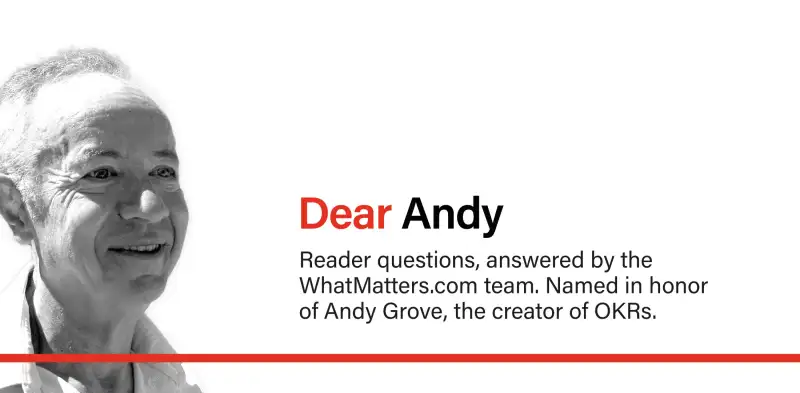Dear Andy,
My University’s I.T. shop is beginning to adopt OKRs, C.I.O. and directors first. My problem is that my portfolio isn’t a “team,” but a small set of individuals who work nationally to deliver our service to researchers across the country.
How do I proceed with aspirational OKRs when I don’t guide a traditional team? I’m worried I’m going to get pushback if people feel like they’re being forced to work together when they’re so used to working separately. Are OKRs even worth doing in the first place?
Sincerely,
Chloe

Hi Chloe,
Thanks for writing in!
If I may be a little presumptuous, the description you give of the people you guide sounds an awful lot like, well, a “team.” What is a team if not a group of individuals working together toward a common goal? “Work nationally to deliver our service to researchers across the country” sounds like more than enough of a common thread to justify using OKRs. In fact, a strong Objective has been known in the past to align a “set of individuals” into a full-blown team — such is the power of OKRs :)
For those who could use a quick reminder, aspirational OKRs are “moonshot goals” that will stretch a team well past their norm — put a man on the moon, end poverty, break a world record, and so on. Aspirational OKRs are actually perfect for your situation, Chloe, because, even though you and your colleagues may have different individual goals, it will be incredibly beneficial to have a common overarching purpose for you all to rally around.
Get together with your colleagues and ask yourselves: What does success for your work look like in its most audacious form? Is there a competitor you’d like to beat? Would you like to beat them by a whole lot? Maybe you want to see your product in every research lab in the country by 2023? What about the whole continent? Aspirational OKRs are all about dreaming big. Even if you only achieve around 70 percent, 70 percent of a big, audacious goal often takes you much further than achieving 100 percent of a less ambitious one.
This level of coordination and cooperation may feel foreign to folks who are used to working strictly as individuals, so it is possible you’ll meet some hesitation from the team. Remind your colleagues that just because OKRs ask everyone to align with a common goal, their individual work hasn’t lost any value. A team OKR can actually help everyone see how their individual priorities connect to the larger whole. We’ve seen that spark engagement and improve the sense of team time and time again.
Finally, don’t underestimate the importance of regular check-ins and Conversations, Feedback, and Recognition (CFRs). I know when I first started using OKRs, I found frequent, honest, and judgement-free discussions about progress (or lack thereof) to be incredibly beneficial in building momentum. Communication is key!
Sincerely,
Billy from the What Matters Team

If you’d like to submit a question to Dear Andy, click here to submit your OKRs for review.



